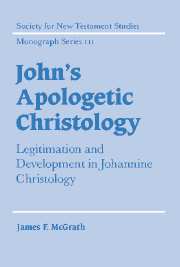Book contents
- Frontmatter
- Contents
- Preface
- Part 1 Introduction
- Part 2 Jesus and God
- Part 3 Jesus, Moses and Torah
- 9 The Word and the glory (John 1.1 – 18)
- 10 Descent and ascent (John 3.1 – 21)
- 11 Bread from heaven (John 6)
- 12 Legitimating signs (John 9)
- 13 Conclusion to part 3
- Part 4 Other issues and conclusion
- 16 Conclusion
- Bibliography
- Index of biblical references
- Index of authors
- Index of subjects
10 - Descent and ascent (John 3.1 – 21)
Published online by Cambridge University Press: 22 September 2009
- Frontmatter
- Contents
- Preface
- Part 1 Introduction
- Part 2 Jesus and God
- Part 3 Jesus, Moses and Torah
- 9 The Word and the glory (John 1.1 – 18)
- 10 Descent and ascent (John 3.1 – 21)
- 11 Bread from heaven (John 6)
- 12 Legitimating signs (John 9)
- 13 Conclusion to part 3
- Part 4 Other issues and conclusion
- 16 Conclusion
- Bibliography
- Index of biblical references
- Index of authors
- Index of subjects
Summary
There is a large amount of agreement that, on one level at least, the dialogue with Nicodemus in John 3.1–21 reflects the discussions and debates which took place between one or more Christian and Jewish communities. Although the language used in this section is in some ways less openly hostile than that used in some other parts of the Gospel, there is still a strong polemical dualism present, distinguishing between ‘us’ and ‘you’ (3.7, 11), belief and unbelief (3.12, 15, 18), light and darkness (3.19–21). These themes suggest that John is engaging here in debate or dialogue with ‘the Jews’, and that we may thus expect him also to provide legitimation for points that were at issue in this controversy.
The point at issue in the conflict
Since Odeberg's work on this passage, it has become more and more widely accepted that John 3.13 reflects a polemic against claims made for other figures to have ascended into heaven, whether figures like Moses and Elijah, or Merkabah mystics. As we have already seen, the question of the relative value of the revelations brought by Jesus and Moses was an important one in the community's debates with the synagogue, and it is therefore likely to be Moses in particular who is in view here. In many streams of Jewish tradition, Moses was believed to have ascended to heaven to receive the Torah.
- Type
- Chapter
- Information
- John's Apologetic ChristologyLegitimation and Development in Johannine Christology, pp. 157 - 171Publisher: Cambridge University PressPrint publication year: 2001



